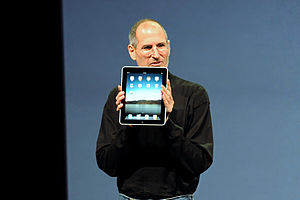 Image via CrunchBase
Image via CrunchBaseUnparalleled success of Apple Inc., and its products, is one of the major reasons behind the plans of Intel Corp's new processors, revealed Tom Kilroy, the senior VP of Intel Corp. He was at the Reuters Global Technology Summit in New York on Wednesday when he stated that the record breaking sales of iPad and other Apple products has lead to give Intel the opportunity to design better processer for future devices. Kilroy said "We work very closely with them and we're constantly looking down the road at what we can be doing relative to future products. I'd go as far as to say Apple helps shape our roadmap." He also confessed that large sales put pressure on the company; he said "Apple -- they push us hard."
 Image via WikipediaAlmost 80 percent of the chips powering all the world's personal computers are of Intel Corp., but despite its lead in the computing market it has still not managed to gain as much success in the mobile market. The market of mobile phone chip making is mostly dominated by the manufacturers which value energy efficient processors, while Intel is very infamous in that regard.
Image via WikipediaAlmost 80 percent of the chips powering all the world's personal computers are of Intel Corp., but despite its lead in the computing market it has still not managed to gain as much success in the mobile market. The market of mobile phone chip making is mostly dominated by the manufacturers which value energy efficient processors, while Intel is very infamous in that regard.In Apple’s MacBook PCs, which is like a role model product for other computer manufacturers, Apple uses the powerful Intel chips. Kilroy seemed very confident when he condemned the predictions that ARM processors, their rival, can topple over their lead as the world's top chipmaker. He said "Go look at the performance of those platforms. They're taking our latest and high-end end versions of second-generation core, and ARM doesn't even come close to any capability there.” Kilroy asserted that he could not tell state for how long Apple will keep using Intel cheeps in the MacBooks, as he claimed that such decision will have to be made by Apple authorities.
After having the motto of building more powerful PC chips for a very long time, Intel is now stressed to produce better energy efficiency ones. Energy efficient chips are the key obligation for any mobile devices which are run on batteries. The market of mobile chips still remains very small when compared with Intel's PC processor market. "There's a lot of experimentation that goes on and we'll see how it plays out. We're eager to understand what usage models become popular," Kilroy said. "We're just happy we're the architecture of choice."


No comments:
Post a Comment